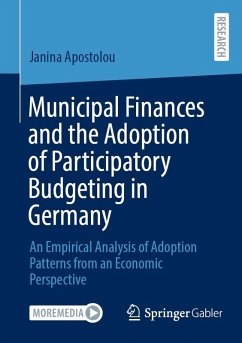Participatory Budgeting (PB) is one of the most popular democratic innovations of recent times. Since its first implementation in Germany in 1998, a growing number of municipalities have experimented with it. Unlike in other countries, PB processes in Germany follow primarily the goal of increasing transparency, efficiency, and service-orientation as part of an effort to modernize public administration. In global comparison, the diffusion of PB in Germany has been rather slow. In this book, the author investigates the question how this specific adoption pattern occurs. For that purpose, she applies theories from Public Administration, Fiscal Federalism, Public Choice, and diffusion of innovations to explain the incentives driving politicians to adopt PB from a public finance point of view. According to empirical analysis by the author, municipalities with a relatively worse financial situation are more likely to adopt a PB process. Consequently, PB processes seem to be used as a tool to spread responsibility, gain legitimacy, and raise understanding by citizens for necessary budget cutting decisions.
About the author
Janina Apostolou completed her Master's degree in International Economy and Business at Andrássy University Budapest. After her studies, she worked as a research assistant at the Department of Financial Sciences at Andrássy University Budapest, where she also completed her PhD studies. Since 2019, she has been serving as a research associate at HAW Hamburg, where she acts as the program coordinator for a collaborative economics program.
Dieser Download kann aus rechtlichen Gründen nur mit Rechnungsadresse in A, B, BG, CY, CZ, D, DK, EW, E, FIN, F, GR, HR, H, IRL, I, LT, L, LR, M, NL, PL, P, R, S, SLO, SK ausgeliefert werden.









